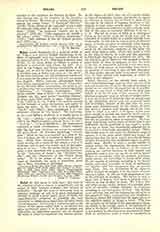

Belial, found frequently as a personal name in the Vulgate and various English translations of the Bible, is commonly used as a synonym of Satan, or the personification of evil. This sense is derived from II Cor., vi, 15, where Belial (or Beliar) as prince of darkness is contrasted with Christ, the light. It is clear in the Vulgate and Douay translations of III Kings, xxi, 10 and 13, where the same Hebrew word is rendered once as Belial and twice as “the devil”. In the other instances, too, the translators understood it as a name for the prince of evil, and so it has passed into English. Milton, however, distinguishes Belial from Satan, regarding him as the demon of impurity. In the Hebrew Bible, nevertheless, the word is not; a proper name, but a common noun usually signifying “wickedness” or “extreme wickedness”. Thus, Moore renders “sons of Belial” as “vile scoundrels” (Judges, xix, 22); most prefer “worthless fellows”. In some cases belial seems to mean “destruction”, “ruin”; thus in Ps., xli, 9 (Heb.), the word is parallel to the thought of utter destruction and seems to mean the same. In Ps., xviii, 5, it is parallel to “death” and “Sheol”; some understand it as “destruction”, Cheyne as “the abyss”. The etymology of the word BL-CL is doubtful; it is usually given as BLY, “not”, “without”, and YCL, a verb which occurs only in the Hiphil (causative active) form, “to use”, “be of use”, “to be profitable to”; the compound is supposed to mean worthlessness. Cheyne suggests BLY YCLCH, that from which no one comes up, namely, the abyss, Sheol. St. Jerome’s etymology “without yoke”, which he has even inserted as a gloss in the text of Judges, xix, 22, is contrary to Hebrew philology. Belial, from meaning wickedness or Sheol, could develop into a name for the prince of evil or of darkness; and as such was widely used at the beginning of our era. Under the names Beliar, Berial, he plays a very important role in apocryphal literature, in the “Ascension of Isaias“, the “Sibylline Ora-Gies”, and the “Testament of the Twelve Patriarchs”. He is the prince of this world and will come as Antichrist; his name is sometimes given also to Nero, returning as Antichrist.
JOHN F. FENLON

